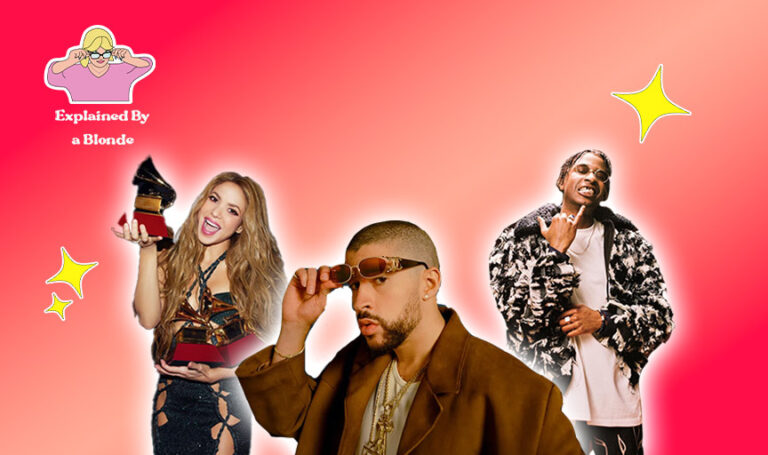Non-English speaking artists are taking over the music industry, here’s why

In 2023, four out of the top 10 most streamed artists globally on Spotify were non-English speaking. In fact, Spotify’s annual Loud & Clear Music Economics Report revealed that out of the 66,000 artists who generated at least $10,000 on Spotify alone, more than half were from countries where English is not the first language. In other words, while a lot of us might think that Taylor Swift dominates the music scene, there’s a lot more talent out there than we might even realise. The music industry has never been so diverse, and it’s not just happened all of a sudden, there’s a reason behind it. Let’s delve in, shall we?
Hi babes, welcome back to Explained By a Blonde where I, your resident blonde, break down different topics in an attempt to educate both myself and my beloved readers. Being the musical queen that I am, I thought this week, we’d look into how it’s now a certified fact that music from all over the world is well and truly taking over. Plus, I’m going to make sure that all of the TikTok haters out there, aka the US Congress, understand just how important the platform has been in diversifying music lovers’ experiences and tastes.
Before we get into the now, it’s important to have a little Marty McFly moment and have a looksie at how governments have played a role in helping international music flourish.
How have countries helped international music grow and find mainstream success?
An article published by The Guardian in 2023 explored how music genres such as Kpop and reggaeton had grown in popularity due to countries’ investment in the creative industries. For example, in the 1990s, South Korea pursued an ethos of cultural development, the likes of which saw Kpop become a global phenomenon.
As part of the nation’s Cultural Policy scheme, both the state and municipal governments doubled down on this investment, committing 1 per cent of budgets to creative industries.
Colombia adopted a similar approach. As the fifth largest country in Latin America, Colombia has played a significant role in both fostering and producing some of the biggest talents in the world. Shakira, J Balvin, and Karol G have some of the most impressive streaming statistics out there. For example, in 2023, in the list of top streamed artists globally on Spotify, Feid—another Colombian singer—ranked at number six, and Karol G at number nine.
@ferxxo444 A petición del publico 💚
♬ sonido original - TeamBros
@shakira Punteria @Cardi B 🏹🌸 new video OUT NOW!
♬ original sound - Shakira
Puerto Rican rapper Bad Bunny is, of course, another great example of a non-English-speaking artist who has completely dominated streaming platforms. Last year, the singer’s album Un Verano Sin Ti secured the title of most streamed album globally, accumulating 4.5 billion plays on the streaming platform.
Spain is another country that prides itself on funding the creative industries. Indeed, according to Pitchfork, on top of about $106 million in national funding for the music and dance industries, the country also budgets about $5.5 million, at the national and regional level, for sending its music abroad.
As a result, there has been a significant shift in the types of music people listen to. For example, some more insights from Spotify revealed that in 2023, there were huge increases in genres like Mandopop, which received more than 500 million monthly streams globally, seeing an almost 45 per cent increase in the past year.
Plus, the consumption of Indian classical instrumental music continues to grow on Spotify in India and around the world, too. In 2023 and 2022, India’s classical music consumption grew by close to 500 per cent on the streaming platform. And, interestingly, over 45 per cent of Indian classical music listeners on Spotify are under the age of 25. Us Gen Zers love a classical vibe.
What role has TikTok played in helping non-English speaking artists go viral?
Now, on to the role of TikTok. We all know that the video-sharing platform is a hotspot for viral sounds, and it turns out that the app has also played a massive role in introducing users to music they might’ve never heard otherwise. Insights from the TikTok 2023 Music Impact report showed that globally, TikTok’s audience exhibits a unique preference for international music. In the UK, users are 77 per cent more likely to want access to global music artists compared to average music listeners.
Moreover, in the US, nearly half (46 per cent) of TikTok users listen to music that is not in English— that’s 27 per cent more likely than music listeners overall.
In 2015, French singer Jain released the song ‘Makeba’. But, it wasn’t until the song got picked up on TikTok and inspired a dance trend that the track blew up, and thus catapulted Jain’s commercial success.
@k.cherryrrehc 마케바~💙#makeba #jain #trending #fyp #김체리 #추천 #challenge #챌린지 #onepickent
♬ Makeba - Jain
The audio is currently sitting on 1.9 billion views… I mean, talk about exposure.
Out of the top 10 songs globally on TikTok in 2023, three were from non-English speaking artists. And in 2024, the trend is only growing, with more and more viral sounds coming from non-English speaking musicians.
With all this in mind, you might just wanna take a few minutes to revisit your Duolingo streak and brush up on your vocab. The international music game is strong and it ain’t going nowhere.





